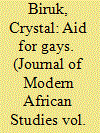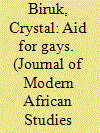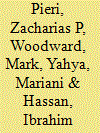|
|
|
Sort Order |
|
|
|
Items / Page
|
|
|
|
|
|
|
| Srl | Item |
| 1 |
ID:
133617


|
|
|
|
|
| Publication |
2014.
|
| Summary/Abstract |
In recent years, 'African homophobia' has become a spectacle on the global stage, making Africa into a pre-modern site of anti-gay sentiment in need of Western intervention. This article suggests that 'homophobia' in post-2009 Malawi is an idiom through which multiple actors negotiate anxieties around governance and moral and economic dependency. I illustrate the material conditions that brought about social imaginaries of inclusion and exclusion - partially expressed through homophobic discourse - in Malawi. The article analyses the cascade of events that led to a moment of political and economic crisis in mid-2011, with special focus on how a 2009 sodomy case made homophobia available as a new genre of social commentary. Employing discourse analysis of newspaper articles, political speeches, the proceedings of a sodomy case, and discussions about men who have sex with men (MSM) as an HIV risk group, I show how African homophobia takes form via interested deployments of 'cultural' rhetoric toward competing ends. This article lends a comparative case study to a growing literature on the political and social functions of homophobia in sub-Saharan Africa.
|
|
|
|
|
|
|
|
|
|
|
|
|
|
|
|
| 2 |
ID:
133618


|
|
|
|
|
| Publication |
2014.
|
| Summary/Abstract |
In recent years, 'African homophobia' has become a spectacle on the global stage, making Africa into a pre-modern site of anti-gay sentiment in need of Western intervention. This article suggests that 'homophobia' in post-2009 Malawi is an idiom through which multiple actors negotiate anxieties around governance and moral and economic dependency. I illustrate the material conditions that brought about social imaginaries of inclusion and exclusion - partially expressed through homophobic discourse - in Malawi. The article analyses the cascade of events that led to a moment of political and economic crisis in mid-2011, with special focus on how a 2009 sodomy case made homophobia available as a new genre of social commentary. Employing discourse analysis of newspaper articles, political speeches, the proceedings of a sodomy case, and discussions about men who have sex with men (MSM) as an HIV risk group, I show how African homophobia takes form via interested deployments of 'cultural' rhetoric toward competing ends. This article lends a comparative case study to a growing literature on the political and social functions of homophobia in sub-Saharan Africa.
|
|
|
|
|
|
|
|
|
|
|
|
|
|
|
|
| 3 |
ID:
131477


|
|
|
|
|
| Publication |
2014.
|
| Summary/Abstract |
This paper examines the concept of (public) sin as well as efforts to counteract sin from the perspective of Islam. The understanding that hisba, the prohibition of vice and enjoining of virtues, are a responsibility of both the state and the community is common in historical and contemporary Muslim societies. Where the state cannot or does not provide means for countering (public) sin, the perception for some Muslims is that the responsibility on the community and individuals to do so increases. Based on ethnographic research in Britain, Nigeria, Indonesia, Malaysia, and Singapore, the paper highlights examples of how sin has been defined amongst Muslim communities as well as the methods and rationales given to justify the forbidding of sin as a collective and communal public obligation. As the world becomes more integrated, there is growing concern amongst Muslim communities that sin is becoming the norm, leading society to degeneracy, that people who would not have otherwise sinned are influenced to do so. Common features in forbidding sin across Muslim communities have appeared, often focusing on what are seen as moral issues such as dress codes, music, gambling, alcohol, smoking, and the mixing of men and women in public. The forbidding of sin has resulted in attempts to introduce "Shari'a Zones" in some predominantly Muslim areas of London, whilst in Indonesia, this has given rise to the Islamic Defenders Front and in some Northern Nigerian states to the reintroduction of the criminal codes of the Shari'a.
|
|
|
|
|
|
|
|
|
|
|
|
|
|
|
|
|
|
|
|
|